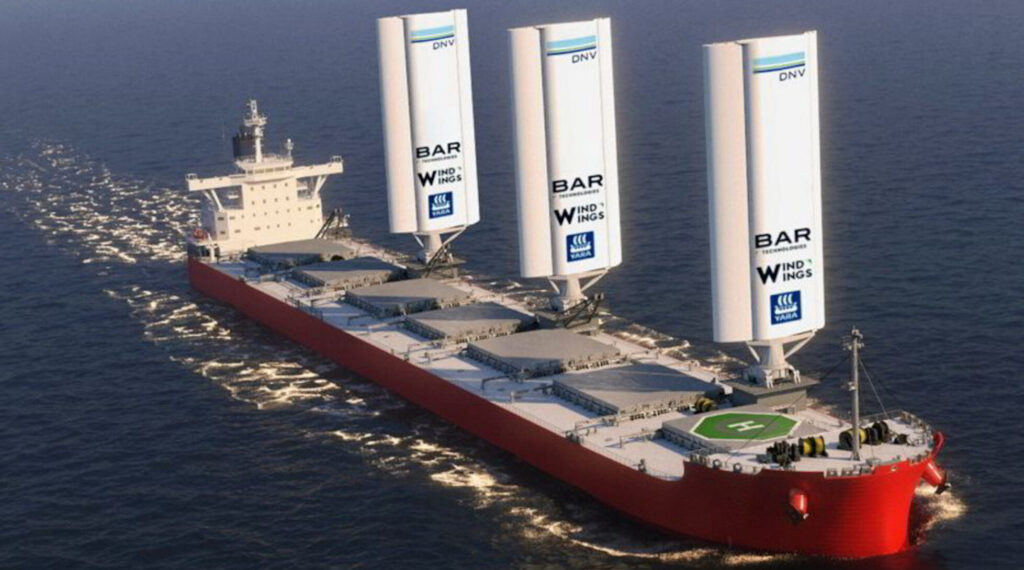Without wind power, massive capital loss is imminent
Wind energy is becoming a key technology for shipping, as a UCL Energy Institute report reveals that without the application of wind energy, the premature scrapping of a fleet worth $400billion is imminent.
A new report by the Energy Institute at London University College points out that the rapid energy transition could lead to the “premature scrapping” of more than a third of the global merchant shipping fleet, worth over $400 billion, unless ships undergo costly modifications to remain competitive in the wake of new greenhouse gas policies and a broader energy transition.
The report reveals that existing ships and newbuildings still on order will produce twice the emissions allowed under a 1.5°C carbon budget, posing a host of supply-side obsolescence and demand-side oversupply risks.
BAR Technologies, a pioneer in sustainable maritime innovation, highlights the crucial role wind propulsion can play in mitigating the risks associated with decarbonising the shipping industry. This comes against growing evidence that progress towards the IMO’s greenhouse gas reduction targets is seriously lacking and doubts remain about the price and availability of lower-carbon fuels. BAR Technologies urges the shipping industry to recognise the immense untapped potential of wind power as a self-sufficient, emission-free and readily available energy source.
Unwarranted hopes for low-carbon fuels
Shipping faces increasing decarbonisation challenges, as emerging competition for cleaner fuels pits maritime fuel demand against other, more homogenised sectors such as aviation. The new demand is expected to lead to higher premiums, leaving operators vulnerable to a double-edged sword of rising fuel costs and inevitable fines if reduction targets are not met. This is exacerbated by the limited purchasing power of smaller fleet operators. Current data from Alphaliner, for example, shows that of the top 100 largest container shipping companies, 76 operate fewer than 50 vessels, and 28 of these operate only 10 or fewer vessels.
Given the further dilutive effect of a multi-fuel future for shipping, there is now a significant risk of operators pinning too much hope on biofuels and other low-carbon types alone. The shipping industry urgently needs to look at wind propulsion to solve these problems. Wind Assisted Propulsion System (WAPS) technologies offer unique protection against energy market volatility and other supply chain risks. Unlike manufactured fuels, wind is infinitely abundant, is harvested on board, is free at the point of use and is not subject to the same technological, economic and market-related disruptions.
Misconception about unreliability of wind power
The misconception that wind power is complex and unreliable ignores a wealth of data to the contrary. Averaged over an extended period, many of the most popular shipping routes show predictable and consistent wind availability in hindcasts. Wind can reduce fuel dependency immediately and permanently, regardless of the type of bunker fuel. “We are at a critical juncture,” says John Cooper, CEO of BAR Technologies. “The shipping industry must now take wind propulsion seriously as a key resource and make more deliberate efforts to address concerns around operational complexity and reliability. As a natural resource, the amount of wind available to harvest will fluctuate on each voyage, but the data is very clear: when averaged over a longer period, wind is a stable, reliable and highly abundant resource that can be effectively ‘bunkered’ along many trade routes.”
Last week, at the RINA conference, the wind sessions also identified new techniques for maximising wind bunkering yields by applying course and speed corrections. Cooper added: “Digital technology exists to support officers and crew in applying effective harvesting techniques and operating WASP safely and easily. By using decades of meteorological data and modern routing technology and with our WindWings, we are confident that shipping can gain a fuel advantage from its own source that other industries simply cannot match.”
Sources: newsletters Clippingnews, Shippingandoceans and MarineLink


